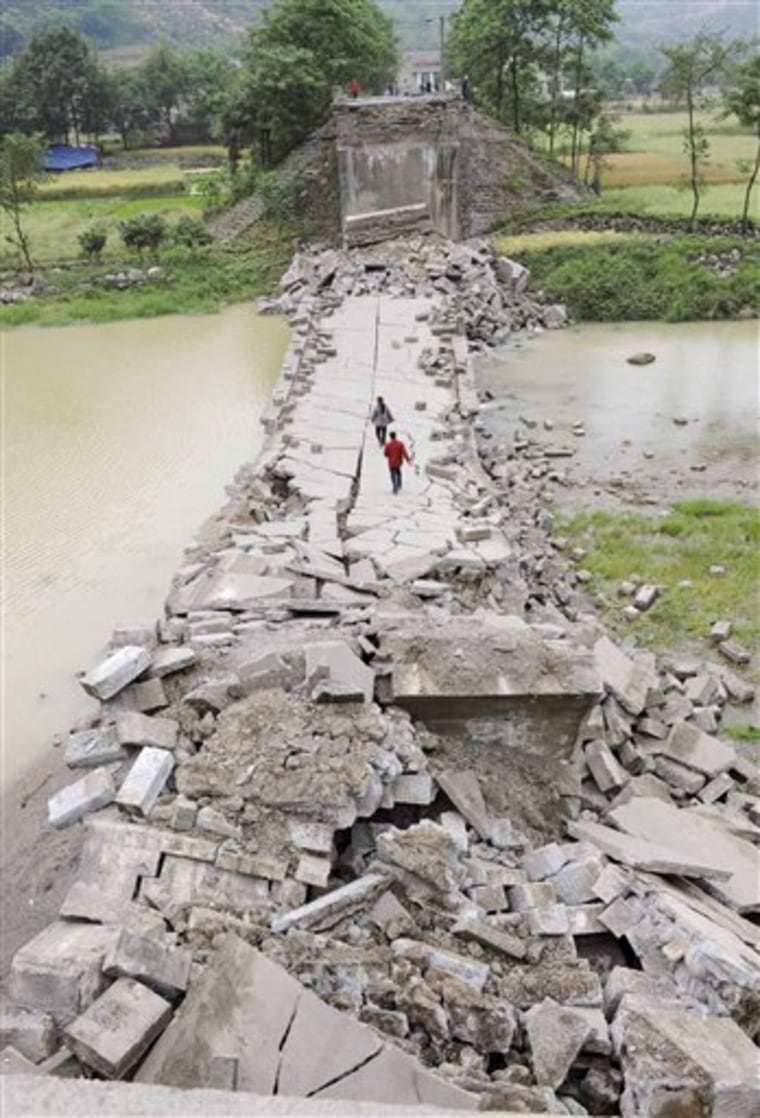The earthquake that ripped through central China’s Sichuan province, killing thousands, crumpling roads and factories and disrupting power and communication, will be only a transitory jolt for the booming economy, analysts say.
As companies assessed damage Tuesday from Monday’s 7.9 magnitude quake, it was clear that even in such a relatively remote region, China’s economy increasingly affects companies worldwide, however.
Japan’s Toyota Motor Corp. and other automakers announced they had temporarily suspended production at factories in Sichuan. Other companies, including Microsoft Corp. and Motorola Inc., reported minor damage to facilities.
“The Chinese economy, of course, will be hit first and the effect on the Japanese economy will come after that,” said Japan’s economy minister, Hiroko Ota. “Because we don’t know the extent of the damage to the Chinese economy yet, it’s hard to tell how much the Japanese economy will be affected.”
Still, financial markets in Asia were mostly higher Monday, reflecting relief over the lack of wider damage and signs that China’s own markets were taking the disaster in stride.
Tokyo’s benchmark Nikkei index rose 1.5 percent, as shares of bulldozer and heavy equipment makers like Komatsu Ltd. rose on expectations of higher demand due to the cleanup and rebuilding from the quake. Hong Kong’s Hang Seng index jumped nearly 2 percent to 25,553.77.
Chinese authorities suspended trading in 66 companies based in the quake zone, helping to limit potential disruptions. The Shanghai Composite Index dropped 1.8 percent to 3,560.24 after falling as much as 3.3 percent earlier. The Shenzhen Composite Index, of China’s second, smaller bourse, slipped just 0.2 percent to 1,109.90.
By late Tuesday, authorities had not yet issued any official estimates of damage from the earthquake, which struck a heavily populated but hilly region north of Sichuan’s provincial capital, Chengdu.
Access to many of the hardest-hit communities was blocked — state-run television reports showed roads impassable due to cracked asphalt and huge piles of rocks from landslides.
China’s work safety agency ordered factories, coal mines, chemical plants and gas wells damaged by the quake to suspend operation for safety inspections.
“All types of production enterprises affected by the disaster, especially coal mines, chemical plants and gas wells, must immediately suspend production and evacuate staff,” the State Work Safety Administration said in a statement on its Web site.
About 600 people died when two chemical plants collapsed in Shifang city just north of Chengdu, spilling more than 80 tons of toxic liquid ammonia, the official Xinhua News Agency reported.
Although far inland, Sichuan is the site of major gas fields, coal mines and the industries that have grown up around them. Past policies promoting industrialization away from coastal areas mean the region has many factories.
China’s main state-owned power company reported that the quake knocked out at least eight power plants and eight transformer substations.
China’s economic planning agency ordered industries to ensure supplies of power, coal and medicine to areas hit by the quake. Banks were told to make sure adequate cash was available, while the Commerce Ministry called for companies to provide emergency shipments of instant noodles, cell phones and other needed equipment.
The earthquake is likely to cause less and lighter damage to the broader economy than severe snowstorms that paralyzed much of south-central China in January and early February, analysts said.
That disaster snarled transportation, knocked out power grids and forced a halt to aluminum smelting and other production in many parts of the country. But China’s economy cooled only slightly, expanding 10.6 percent in January-March from a year earlier, compared with an 11.2 percent expansion in the previous quarter.
“Compared with the snowstorms, this is confined to one area and it is a very brief time,” said Feng Yuming, an analyst with Oriental Securities in Shanghai.
Sichuan and the adjacent industrial center of Chongqing account for only about 3.5 percent of the country’s total manufacturing and 1 percent of total exports, according to Mingchun Sun, a Lehman Brothers economist.
“While the quake caused significant damage to human lives and infrastructure, we expect its impact on China’s economic growth to be temporary and limited,” Sun said in a report Tuesday.
Still, Sichuan produces about 9 percent of China’s total rice harvest. Even if there’s little disruption to crops, given recent worries over shortages and surging prices, the disaster could fuel panic buying that would drive prices higher.
Strong demand for food, consumer items and construction materials could push prices higher at a time when China already is struggling to contain inflation, which remains near decade-high levels.
But those pressures are bound to fade, as authorities restore roads and supply networks, said Qian Wang, an economist with JPMorgan Chase Bank in Hong Kong.
“Experience shows that inflation or disruption of economic activities caused by natural disasters tends to be negligible and temporary,” Wang said. “Meanwhile, we believe that post-earthquake reconstruction would pick up significantly, providing a strong boost to the regional economy.”
